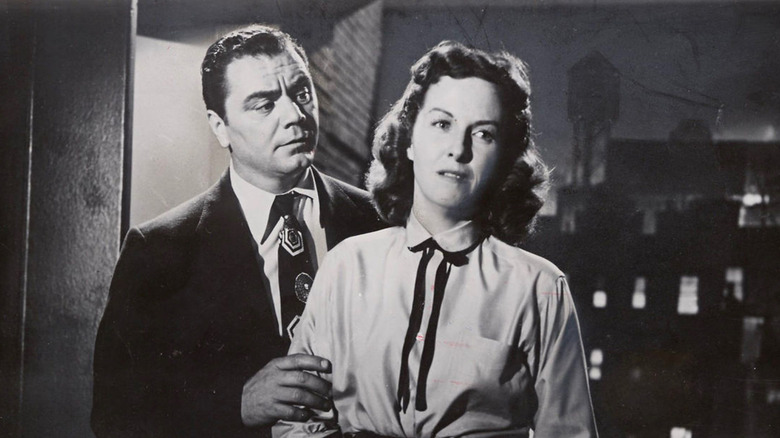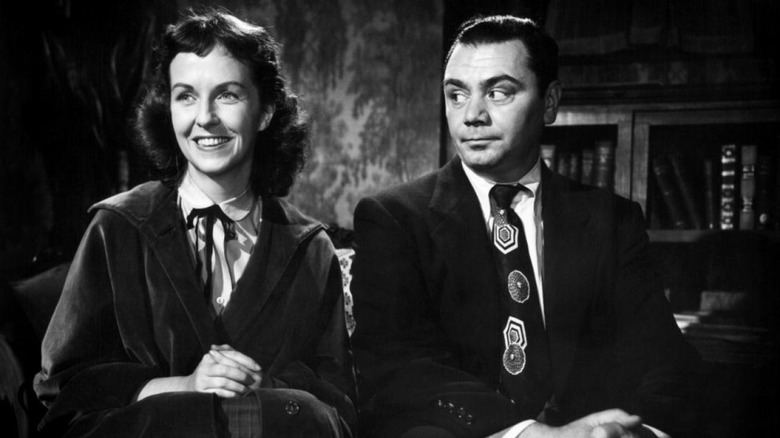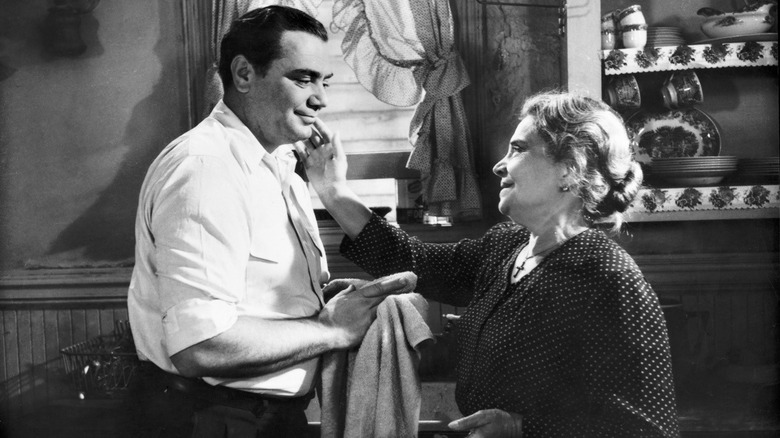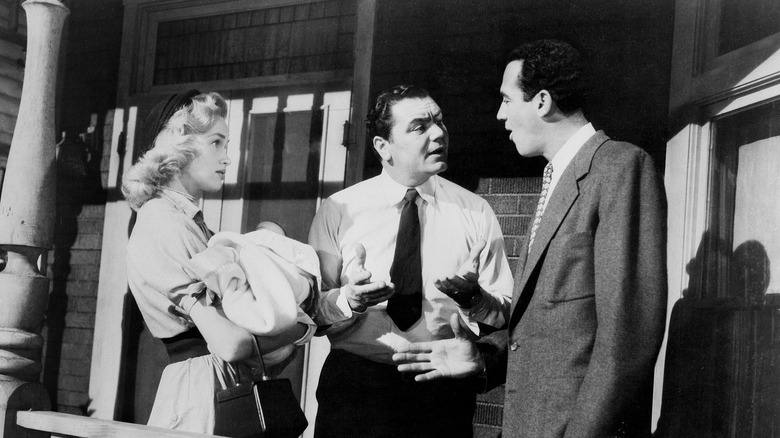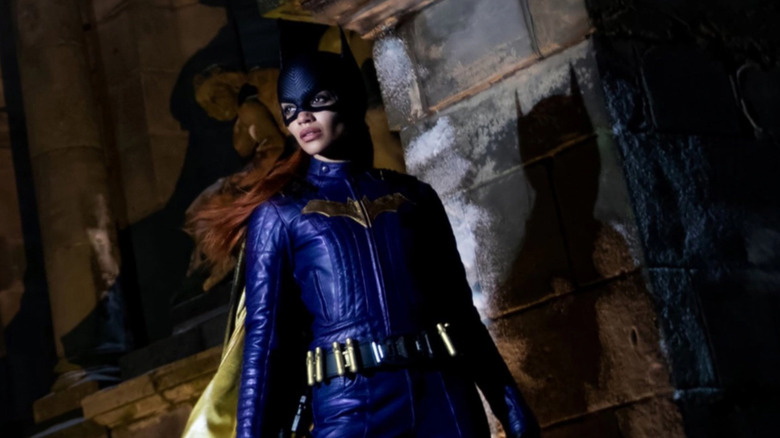This Best Picture Winner Almost Got The Batgirl Treatment
Much has been made about the stunning decision by Warner Bros. Discovery to shelve the $90 million-dollar DC superhero film "Batgirl" ahead of its anticipated debut on HBO Max. As it stands, the newly-minted powers that be at the studio (including CEO David Zaslav) saw fit to use a "purchase accounting" maneuver to write off the movie and not carry the losses in a limited-timeframe tax loophole. While reports on whether the film tested well or not have been mixed, the move stands as a stain on the Warners reputation and will surely put talent off of working with the studio knowing their creative efforts might never see the light of day.
Dumping a film from release permanently is a rare move by major studios, although not unheard of. In 2007 director Beeban Kidron ("Bridget Jones: The Edge of Reason") began shooting the British counterculture drama "Hippie Hippie Shake" starring Cillian Murphy and Sienna Miller for Working Title Productions and Universal Pictures. Then in 2009, Kidron left the film over post-production creative differences and Universal decided that instead of releasing it in 2010 they would shelve it forever, possibly to mitigate losses on their expensive Matt Damon flop "Green Zone." It is rumored that the "Hippie Hippie Shake" negative had to be destroyed in order to get the write-off. In 2017 Miller confirmed the permanence of the shelving by saying, "I don't think we'll see it at this point."
At this point, the important question might be why "Batgirl" should be released, and the answer may lie in a little movie that could from 1955 called "Marty." Kino Lorber recently put out a new special edition Blu-ray of the Ernest Borgnine classic featuring a commentary track by this author (alongside Bryan Reesman), and during research for that track, a fascinating story about the best picture Oscar winner almost never seeing the light of day was unearthed.
'Turns out there were some financial shenanigans...'
"Marty" would prove to be a career-defining role for a then-fledgling character actor named Ernest Borgnine, who even in flattering press was described as "a big ugly, hulking guy" far from the screen idols of the time like Cary Grant or Rock Hudson. Produced on a relatively paltry budget — even for the time — of $273,000, with only $5000 going to Borgnine, the film was based on a 1953 NBC TV play written by Paddy Chayefsky ("Network") and directed by Delbert Mann ("Desire Under the Elms"), who would both return for the big screen take. Originally starring Rod Steiger as the homely Bronx butcher who longs for love, the film version swapped in Borgnine after the more intense Steiger refused the draconian contract terms of production company Hecht-Lancaster.
Made up of literary agent/House Committee on Un-American Activities informer Harold Hecht (nicknamed "the Mole") and intimidating movie star/former circus acrobat Burt Lancaster (who worked with Borgnine in the previous year's best picture winner "From Here to Eternity"), Hecht-Lancaster had designs to make a European-style realist movie in Hollywood by shooting all the exteriors on actual New York City locations. However, as Borgnine describes in his autobiography "Ernie," when the company returned to LA they found that things weren't strictly on the up-and-up:
"We came back to Hollywood to finish shooting the film, but there was a problem. No Sets. Everybody was stunned, especially Delbert, who had been told that they were being built. Turns out there were some financial shenanigans attached to the picture. The plan, I later learned, was to shoot half the movie, then put it on the shelf and write it off. That was, the producers could pay themselves a salary, yet not have to show a corporate profit. But the tax man said no. In order to do that, they had to finish the picture, show it once, and then take a loss. I'm not sure that was good news, but it was better news. We'd get to finish the film."
'This is the movie you weren't going to finish?'
In "Marty," overweight butcher Marty Piletti (Ernest Borgnine) meets a sweet-but-shy school teacher named Clara (Gene Kelly's then-wife Betsy Blair) but is nearly talked out of pursuing a relationship due to an overzealous mother played by Esther Minciotti. After completing the film in 16 days (plus an additional three for reshoots), Borgnine was invited to screen the finished product in LA alongside the Hecht-Lancaster producers, as described in his book:
"I didn't realize what we really had until I saw Burt Lancaster get up and motion for Harold Hecht to follow him. They walked to a corner of the room, where Burt picked him up by the front of his blazer, held him against the wall, and said, 'This is the movie you weren't going to finish? Why the hell didn't you shoot more?'"
Now officially fired up about the movie, Lancaster hired publicity agent Walter Seltzer to promote "Marty" with countless word-of-mouth screenings for the public. The story of a sad sack momma's boy with a big heart won over audiences in a big way, its touching kitchen-sink melodrama of a guy having to choose between family and the woman he loves proves exceedingly relatable. It eventually took in over $5 million at the box office (over $55 million adjusted for inflation), won the prestigious Golden Palm (later known as the Palme d'Or) at the Cannes Film Festival, and garnered eight Academy Award nominations as well as four wins for best director (Delbert Mann), best screenplay (Paddy Chayefsky), best actor (Borgnine), and best picture (Hecht). Yes, the man who planned to use "Marty" as a sleazy tax dodge wound up winning the biggest movie honor there is, but that's showbiz for ya.
'I seemed to have been surrounded by evil'
If you think the shady Hecht-Lancaster duo learned anything from their thwarted shenanigans on "Marty," think again. After a dispute over payment for a supporting role as a corrupt cop in 1957's Lancaster-starring vehicle "Sweet Smell of Success," Borgnine's multi-picture deal with the company (and the cash promised) was suspended. This was only seven months after he'd won his Oscar. Perhaps he was better off, as that film's composer Elmer Bernstein ("To Kill a Mockingbird") described the on-set atmosphere of "Sweet Smell" as "a snake pit" in a 2010 Vanity Fair story. Screenwriter Ernest Lehman ("North by Northwest") also detailed executive meetings about finding someone to procure females for the Hecht-Lancaster company offices, where womanizing was profligate. The production eventually made Lehman so physically ill he left under a doctor's orders:
"I seemed to have been surrounded by evil, but they were the ones who felt a great affinity for 'Sweet Smell.' They dug it. Nobody else did, really. The film could only have been made by Hecht-Hill-Lancaster... They were the most corrupt group. I really sank into the depths when I decided to work with them."
The partnership between Hecht and Lancaster dissolved in 1960, although Hecht would be Oscar-nominated again in 1959 for Delbert Mann's "Separate Tables," while Lancaster would win one for his lead role in 1960's "Elmer Gantry."
Can Batgirl be saved?
The biggest takeaway lesson from "Marty" is clear: Hecht-Lancaster set out to make a fairly inexpensive movie with no-name stars and then bury it to enrich themselves, and then the quality and — above all — social importance of the movie made it too valuable to shelve. Sight unseen, "Batgirl" may not have the makings of an Oscar-caliber film, but it does stand as a big step towards representation both in front of and behind the camera. In a superhero era defined by Iron Men, X Men, and many assorted Bat Men, "Batgirl" looked to be a fresh take on an increasingly stale testosterone-fueled formula.
Aside from the remarkable Dominican-American lead found in star Leslie Grace ("In the Heights") as Barbara Gordon, the film also had diverse talent behind the camera with Muslim filmmaking duo Adil El Arbi and Bilall Fallah as well as half-Taiwanese screenwriter Christina Hodson, drawing from the remarkable "Batgirl" comics run by Gail Simone. Perhaps the most important ingredient here is Alysia Yeoh, a transgender character who acts as both Barbara's roommate and chief confidante. Portrayed in the now-defunct film by trans Filipina-American actress Ivory Aquino ("When We Rise"), the fan-favorite character would have broken as much ground in movies as she did in the comics. It's no wonder that Aquino recently sparked a discussion with an open letter to Warner's David Zaslav asking him to reconsider releasing the film:
"I do know and ask, with something like 'Batgirl' that's a product of our hearts and souls, that the little cogs not simply be seen as widgets whose fates are determined by an equation to benefit the bottom line. More than widgets, we are fellow human beings and artists who, when given the chance, can outperform the equation and multiply."
The truth
What Aquino says here may not sink into the cold pragmatic mind of an executive like Zaslav, but it is the truth, as "Marty" proved 67 years ago. If a little kitchen-sink movie like "Marty" can outperform the equation, so too can "Batgirl" be seen not just as an increasingly-pointless piece of corporate IP translating to dollar signs but as an engine of change, a symbol of hope, a beacon not unlike the bat symbol itself.
If "Batgirl" should ever see the light of day, it could be a triumph for underrepresented individuals in the pop culture landscape, the same way the lonely and downtrodden and "ugly" found hope in the character of Marty Piletti. There's always an underrepresented class of people who want to see themselves on screen, and they will come in droves if a studio is savvy enough to let them be seen.
